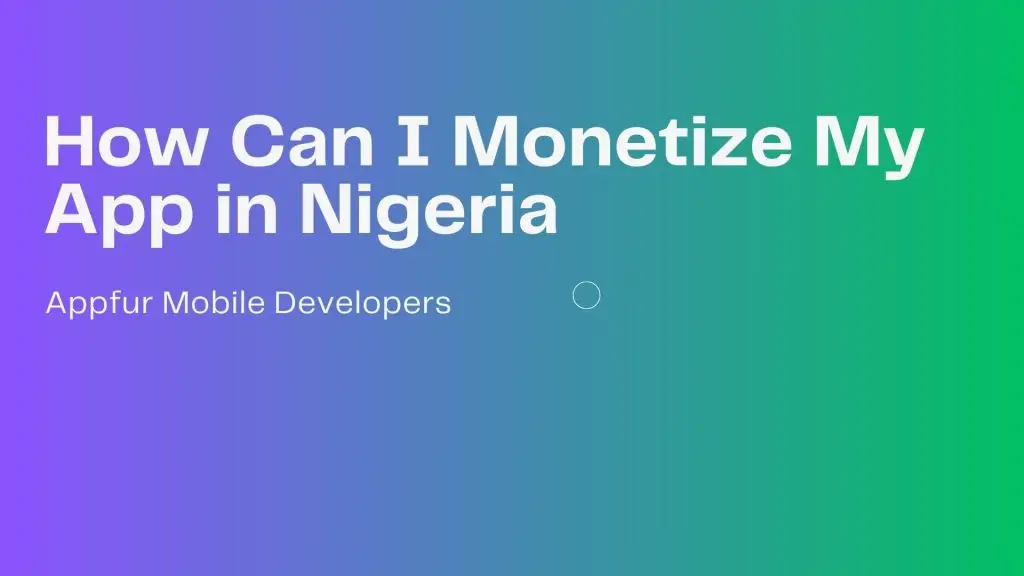Did you know?
Over 122 million Nigerians use smartphones, and more than 70% of them download at least one new app every month. Yet, only a small percentage of app owners in Nigeria actually earn consistent income from their apps.
This means there’s a massive opportunity for developers and entrepreneurs who understand how to monetize apps effectively in the Nigerian market.
Whether you’ve built a fintech solution, delivery app, or a social platform, this guide breaks down proven strategies to turn your app into a sustainable business in Nigeria.

1. In-App Advertising
One of the easiest ways to monetize your app is through ads. You can earn money each time users view or click ads displayed within your app.
Top platforms for ad monetization include:
- Google AdMob
- Meta Audience Network
- AppLovin
- Unity Ads
To keep users engaged, use native or rewarded ads that blend naturally with your app content instead of intrusive pop-ups.
Best for: Free apps, gaming apps, and entertainment apps.
2. In-App Purchases
With in-app purchases, users can buy extra features, digital goods, or premium content directly inside your app.
Examples:
- Gaming apps can sell coins, weapons, or power-ups.
- Education apps can unlock advanced lessons or certifications.
- Social apps can sell premium badges or exclusive access.
Best for: Gaming, education, and social networking apps.
3. Subscription Model
Subscriptions provide a recurring income stream by charging users monthly or annually for ongoing value.
Example pricing:
- ₦1,000/month for premium access
- ₦10,000/year for VIP features
Tools like Paystack Plans and Flutterwave Subscriptions make it easy to set up recurring billing in Nigeria.
Best for: Streaming, fitness, news, and e-learning apps.
4. Freemium Model
The freemium model allows users to access basic features for free while paying for premium upgrades.
Examples:
- Free users get limited access.
- Paid users enjoy ad-free experiences or advanced features.
It’s one of the most effective models globally — and it works very well in price-sensitive markets like Nigeria.
Best for: Fintech, productivity, and utility apps.
5. Affiliate Marketing
With affiliate marketing, you earn commissions by promoting third-party products or services within your app.
Examples:
- A finance app can promote investment platforms.
- A lifestyle app can recommend fashion stores or tech gadgets.
Join affiliate programs such as:
- Jumia Affiliate Program
- Konga Affiliate Program
- Amazon Associates
Best for: Lifestyle, shopping, and finance-related apps.
6. Sponsorships and Brand Partnerships
If your app has a loyal user base, local brands may want to partner with you to reach your audience.
You can:
- Display their banners or ads.
- Promote campaigns or offers.
- Run giveaways or branded events.
Best for: Niche apps with strong engagement and defined audiences.
7. Data Monetization (Ethically)
If your app collects user insights — such as anonymous usage trends — you can sell aggregated data to research firms or brands, provided it’s done transparently and legally.
Always ensure compliance with NDPR (Nigeria Data Protection Regulation) and GDPR guidelines.
Best for: Apps with large user bases, especially in mobility, lifestyle, or finance.
8. Selling Digital Products or Services
Your app can serve as a direct marketplace for digital products or services.
Examples:
- An e-learning app selling digital courses.
- A medical app offering teleconsultations.
- A design app selling creative templates.
Payment gateways like Paystack, Flutterwave, and Monnify simplify the process.
Best for: Service-based and content-driven apps.
9. Crowdfunding and Donations
If your app offers community value, users may be willing to support it voluntarily through donations or crowdfunding.
Popular platforms include:
- Patreon
- Buy Me a Coffee
- Flutterwave Store Donations
Best for: Social impact, religious, or educational apps.
10. App Licensing and White-Labeling
You can license your app or sell white-labeled versions to other businesses under their branding.
For example, if you’ve built a delivery or booking app, you can sell custom versions to logistics or restaurant brands.
Best for: B2B solutions and niche platforms.
Pro Tips for App Monetization in Nigeria
- Know your audience: Nigerians are price-conscious; offer affordable tiers and incentives.
- Use local payment systems: Integrate Paystack, Flutterwave, or Moniepoint for easy payments.
- Optimize performance: A fast, user-friendly app retains users and boosts revenue.
- Market your app: Combine SEO, social media, and paid ads for visibility.
- Measure results: Use Firebase Analytics or Appsflyer to track revenue and engagement.
Final Thoughts
Monetizing your app in Nigeria is not just about adding ads or subscriptions — it’s about creating real value for users while aligning with local payment habits and digital behavior.
Start small with one monetization model, test what works best for your audience, and scale strategically.
If you want expert help to build, launch, or monetize your app effectively,
Appfur can guide you every step of the way — from idea to income.
Ready to turn your app into a profitable business?
Contact Appfur today and let’s help you monetize smarter.
We design and build high-quality, scalable mobile apps tailored to your needs.
Let’s talk! Message us on WhatsApp now: Click Here
Your next big app starts here!
